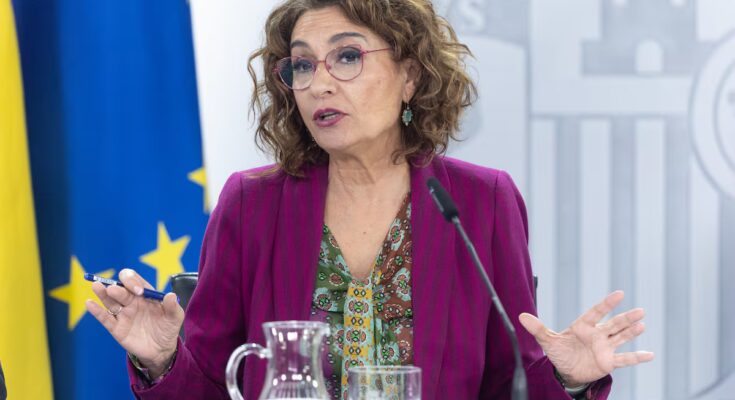On Tuesday, the Government publicly acknowledged for the first time what was evident: that it will not present the 2026 Budgets before the end of the year, as Pedro Sánchez had assured in October. The latest roadmap managed by the First Vice President and Minister of Finance, María Jesús Montero, plans to do so in the first quarter of 2026, preferably in February – which would make the negotiations coincide with that of the regional financing model, approved in 2009 and obsolete since 2014 – so that they are approved in April or May. For now the Executive does not have the necessary support after the express rejection of Junts but it is not throwing in the towel: government sources believe they can still reorient relations with the neo-convergents and draw up the budgets taking advantage of the foreseeable return of Carles Puigdemont to Spain in the spring. Plan B would be to bring them back if a window of opportunity opens with the government’s more fractious partners.
La Moncloa’s conclusion is that the report of the Advocate General of the Court of Justice of the European Union (CJEU) on the amnesty paved the way for the return of the leader of the Junts, as it usually coincides with the direction of EU court rulings. The Government believes that, if its calculations were confirmed, Junts would take into account the costs and strain that the approval of the pardon measure caused to the PSOE. This way, in the event that the budgets were overturned, if Junts subsequently lifted the veto because Puigdemont benefited from the application of the amnesty law, then the government would try them again in the Cortes.
“I don’t think that the accounts can be presented before (first quarter of 2026) because the support of the political groups is needed. In any case, when the budgets have already been prepared, every window of opportunity must be exploited. And this means that, if during the year there is a window of opportunity because some political group of those a priori “If they are not willing to give support, they decide to give it, the draft budget will be presented”, declared Montero after the approval of the stability path and the spending ceiling for next year. “I am of the opinion that, after having made them and agreed with many groups, we must approve them when possible and that is why we work permanently so that they can be approved. These are the dates I have in mind, but they may vary depending on events. Tomorrow you will tell me different groups who are willing to support them now and I will tell them that we will present them by the end of this year”, added the number two of the Government.
The reality is that the Government approved the stability path and the spending ceiling for 2026 with months of delay – usually done in the summer – a necessary previous step to prepare the general state budget project. The Executive highlights the good macroeconomic data, with an upward revision of the GDP forecasts for this year from 2.7% to 2.9%, but has so far failed to approve the bills in the legislature and for this reason keeps those for 2023 extended, when the composition of the Congress was different from the current one.
The Government has increased the ceiling of non-financial expenditure in the Budget to 216,177 million euros, or 8.5% more than last year, a public expenditure according to Montero that is “attractive” for the rest of the parties. The first vice president increased the pressure on the PP, whose barons govern in 12 autonomous communities in addition to the cities of Ceuta and Melilla, since in her opinion they would hardly be able to justify a new reversal of the stability path as occurred during the legislature. “The spending ceiling increases by 8.5% and allows us to consolidate the welfare state; it is attractive so that no one can resist,” said Montero. “It gives more resources, more fiscal capacity, if the communities, especially in the PP, give up access to these resources, the General Administration of the State will be happy to accept those resources for its policies. But it seems absurd to me to throw stones against its own roof… It is not understood that when measures are put on the table, people say no out of pure partisan interest,” he added.
But Montero doesn’t place much hope in Alberto Núñez Feijóo’s party. Last year the PP communities abstained from the Fiscal and Financial Policy Council and then the PP voted against it in Congress. “This year they didn’t make it ridiculous and voted directly against it. How do they explain Bonilla or Ayuso who refuses to have greater spending capacity for not trying to vote for anything of this government coalition, without taking into account the content?” scolded Montero.
The PSOE, as its spokesperson in the Chamber, Patxi López, demonstrated on Tuesday, will arm itself with all kinds of data to demonstrate that the parties that will boycott this first step of the hypothetical State Budget for 2026 are the ones that “will have to explain well and slowly” why they give up on the fact that autonomies, councils and municipal councils have billions in new revenue, between 7% and 8% more than last year. López also added to these percentages the advance payments that the Executive plans to facilitate to bring the total amount to be transferred to these administrations beyond 170,000 million euros.
This complex situation for the Executive led the parliamentary spokesperson of the PP, Ester Muñoz, to conclude that the Government will for now transfer that document to the plenary session on Thursday next week “to make things worse” and give the feeling “that they are doing something” when they do not have the support to move forward but rather “a majority against”, especially after the dismissal of Junts. It is the position also used by the leader of Vox, Santiago Abascal.
The political problem for the Executive is that several parties in the investiture pact are no longer on the same page. And not just Junts, who has warned several times in recent weeks that he is not part of that bloc and will not vote for this first step of the Budget because he understands that the points envisaged for Catalonia by all the precedents of this phase with Pedro Sánchez in La Moncloa or with the PP governments have not been carried out.
Podemos will not support this project either. His congressional spokeswoman, Ione Belarra, argued Tuesday that it is “not possible” to separate the debate over the path of the deficit and the budget. “It’s the same debate and, therefore, I believe that if the government had the will to carry forward these budgets, it should have started negotiating with the groups,” added Belarra, later specifying that he does not consider this scheme of public accounts “real budgets”, but rather “country budgets”. Belarra reiterated the criteria for his party to change its position and be able to support the budgets with which to face the right: “We must intervene on the price of housing, we must stop corruption and obviously we must abandon this militarist drift.”
The MP from Compromí, now in the Mixed Group, Àgueda Micó, also reproached the Government for not contacting him to discuss the proposal. “I don’t know if the government has enough support for the budgets, because they haven’t told me anything,” replied Micó, who argues that the ability to borrow should rest “mainly” with the autonomous communities.



